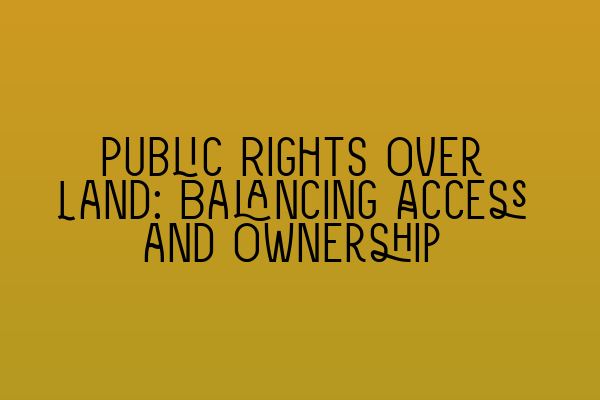Public Rights Over Land: Balancing Access and Ownership
In the realm of property law, one of the most complex issues to navigate is the balancing act between public rights over land and private ownership. While property owners have the right to control and enjoy their land, society also values access to open spaces for various purposes. This dichotomy raises important questions: What are public rights over land? How can we strike a balance between access and ownership? In this blog post, we will explore these questions and delve into the intricacies of this fascinating area of law.
Understanding Public Rights Over Land
Public rights over land refer to the legal rights that individuals and the public as a whole have to access and use certain areas of land, regardless of who owns the land. These rights are often intertwined with the concept of easements, which are legal encumbrances on a property that give others the right to use it for specific purposes.
Public rights over land can take various forms, including:
1. Right of way: This allows individuals to pass through private land, such as pedestrian pathways or vehicular access routes. These rights of way can be established through public dedication, custom, or by specific legal arrangements.
2. Access to natural resources: Certain public rights grant access to natural resources like rivers, lakes, forests, or coastline for fishing, recreational activities, or conservation purposes.
3. Public spaces: There may be designated public spaces within private land that are open for public use, such as parks, gardens, or squares. These spaces enhance the quality of life in urban areas and provide opportunities for social interaction and leisure.
4. Conservation areas: In some cases, the public may have access rights to specific areas of land that are deemed of significant ecological or historical importance. These areas are protected to ensure their preservation for future generations.
Balancing Access and Ownership
The challenge lies in finding a harmonious equilibrium between public access and private ownership. While property owners have the right to enjoy and control their land, it is also essential to uphold the values of inclusivity, sustainability, and community well-being. Striking this balance requires careful legal considerations and a nuanced approach.
1. Statutory safeguards: Legislation plays a crucial role in protecting public rights over land. Various laws, regulations, and zoning restrictions ensure that public access is not unreasonably restricted and that spaces with important ecological or cultural value are preserved.
2. Negotiation and agreements: Property owners and relevant stakeholders can engage in negotiation and enter into agreements that address public use and access to their land. These agreements can provide a framework for maintaining private ownership while ensuring public benefits.
3. Public interest and impact assessment: In cases where public access rights conflict with private ownership, courts and regulatory bodies must carefully weigh the public interest against the impact on property owners. Public consultation and impact assessments allow for a balanced decision-making process.
4. Maintenance and responsibility: Public access to private land should be accompanied by responsibilities. Property owners should not bear the burden of maintenance and upkeep alone, and public users must respect the property rights of others and adhere to any conditions set by the owner.
Conclusion
Public rights over land are vital for the social, cultural, and environmental fabric of our communities. Balancing access and ownership requires a nuanced and collaborative approach to ensure that private property rights are respected, while public access is facilitated where it serves the greater good. By navigating this complex legal landscape, we can create a harmonious coexistence between private property owners and the public, fostering a society that values inclusivity, sustainability, and shared spaces.
If you require expert legal advice on property law and land law matters, do not hesitate to contact SQE Property Law & Land Law. Our team of experienced solicitors is well-versed in navigating the intricacies of public rights over land and can provide sound guidance tailored to your specific needs.
